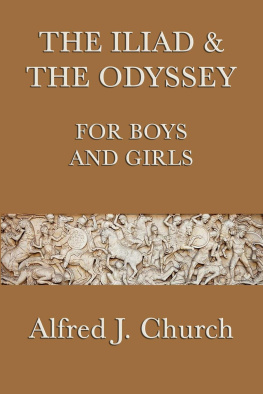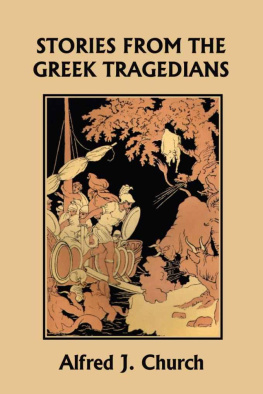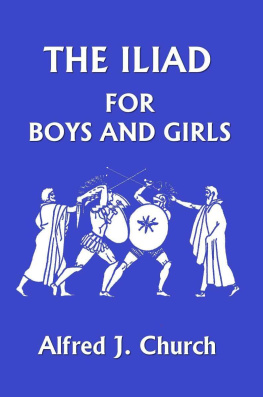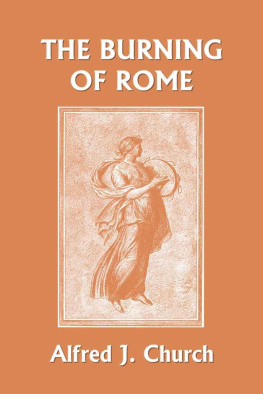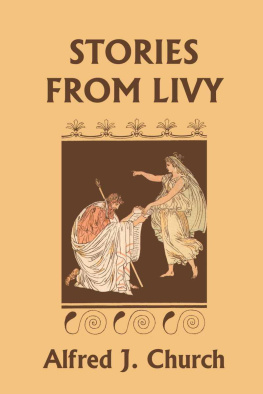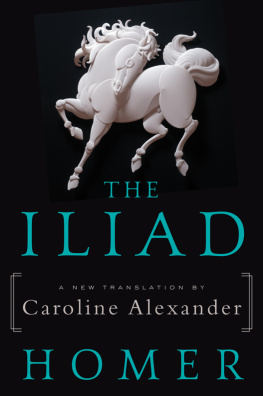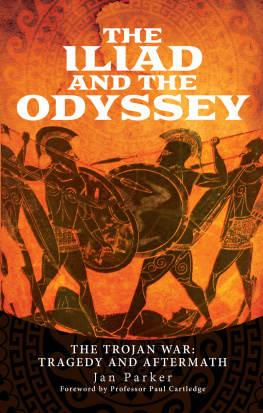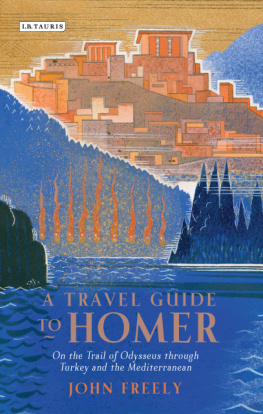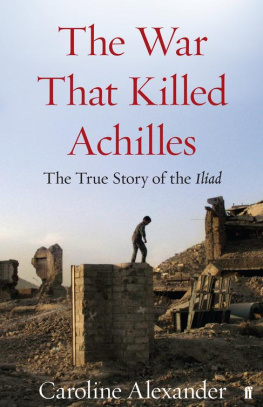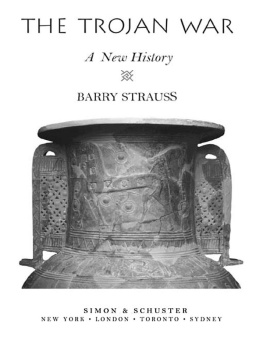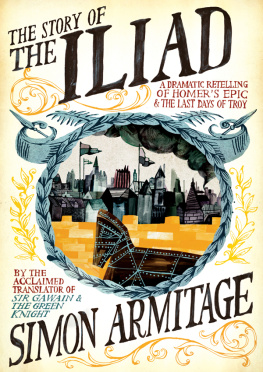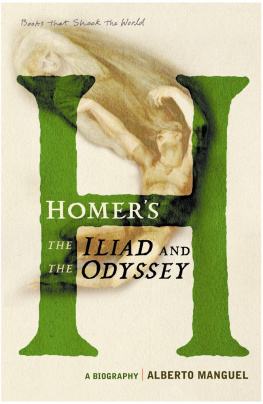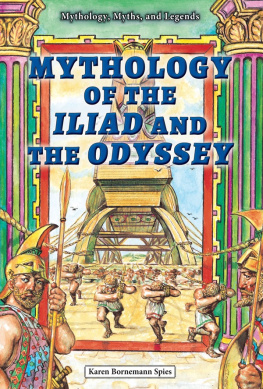The Iliad & The Odyssey
for Boys and Girls
By Alfred J. Church
Start Publishing LLC
Copyright 2012 by Start Publishing LLC
All rights reserved, including the right to reproduce this book or portions thereof in any form whatsoever.
First Start Publishing eBook edition October 2012
Start Publishing is a registered trademark of Start Publishing LLC
Manufactured in the United States of America
10 9 8 7 6 5 4 3 2 1
ISBN 978-1-62558-243-0
The Iliad for Boys and Girls
The Duel of Paris and Menelaus
On the day after the False Dream had come to him Agamemnon called all his army to go out to battle. All the chiefs were glad to fight, for they thought that at last the long war was coming to an end. Only Achilles and his people stopped behind. And the Trojans, on the other hand, set their army in order.
Before they began to fight, Paris, who had been the cause of all the trouble, came out in front of the line. He had a panthers skin over his shoulders, and a bow and a quiver slung upon his back, for he was a great archer; by his side there hung a sword, and in each hand he carried a spear. He cried aloud to the Greeks: Send out the strongest and the bravest man you have to fight with me. When King Menelas heard this, he said to himself: Now this is my enemy; I will fight with him, and no one else. So he jumped down from his chariot, and ran out in front of the line of Greeks. But when Paris saw him he was very much afraid, and turned his back and ran behind the line of the Trojans.
Now the best and bravest of the Trojans was a certain Hector. He was one of the sons of King Priam; if it had not been for him the city would have been taken long before. When he saw Paris run away he was very angry, and said: O Paris, you are good to look at, but you are worth nothing. And the Greeks think that you are the bravest man we have! You were brave enough to go across the sea and steal the Fair Helen from her husband, and now when he comes to fight with you, you run away. The Trojans ought to have stoned you to death long ago.
Paris answered: You speak the truth great Hector; I am, indeed, greatly to be blamed. As for you, you care for nothing but battles, and your heart is made of iron. But now listen to me: set Menelas and me to fight, man to man, and let him that conquers have the Fair Helen and all her possessions. If he kills me, let him take her and depart; but if I kill him, then she shall stay here. So, whatever may happen, you will dwell in peace.
Hector was very glad to hear his brother Paris speak in this way. And he went along the line of the Trojans, holding his spear in the middle. This he did to show that he was not meaning to fight, and to keep his men in their places that they should not begin the battle. At first the Greeks made ready spears and stones to throw at him, but Agamemnon cried out: Hold your hands; great Hector has something to say.
Then every one stood still and listened. And Hector said: Hear, Trojans and Greeks, what Paris says, Paris, who is the cause of this quarrel between us. Let Menelas and me fight together. Every one else, whether he is Greek or Trojan, shall lay his arms upon the ground, and look on while we two fight together. For the Fair Helen and her riches we will fight, and the rest will cease from war and be good friends for ever.
When Hector had spoken, King Menelas stood up and said: Listen to me, for this is my affair. It is well that the Greeks and Trojans should be at peace, for there is no quarrel between them. Let me and Paris fight together, and let him of us two be slain whose fate it is to die. And now let us make a sacrifice to the gods, and swear a great oath over it that we will keep our agreement. Only let King Priam himself come and offer the sacrifice and take the oath, for he is more to be trusted than the young men his sons.
So spoke Menelas; and both the armies were glad, for they were tired of the war.
Then Hector sent a messenger to Troy to fetch King Priam, and to bring sheep for the sacrifice. And when the herald was on his way, one of the gods put it into the heart of the Fair Helen as she sat in her hall to go out to the wall and see the army of the Greeks. So she went, leaving the needlework with which she was busy, a great piece of embroidery, on which the battles between the Greeks and the Trojans were worked.
Now King Priam sat on the wall, and with him were the other princes of the city, old men who could no longer fight, but could take counsel and make beautiful speeches. They saw the Fair Helen as she came, and one of them said to another: See how beautiful she is! And yet it would be better that she should go back to her own country, than that she should stop here and bring a curse upon us and our children.
But Priam called to her and said: Come hither, my daughter, and see your friends and kinsmen in yonder army, and tell us about them. Who is that warrior there, so fair and strong? There are others who are even a head taller than he is, but there is no one who is so like a king.
That, said Helen, is Agamemnon, a brave soldier and a wise king, and my brother-in-law in the old days.
And King Priam cried: Happy Agamemnon, to rule over so many brave men as I see in yonder army! But tell me who is that warrior there, who is walking through the ranks of his men, and making them stand in good order? He is not so tall as Agamemnon, but he is broader in the shoulders.
That, said Helen, is Ulysses of Ithaca, who is wiser than all other men, and gives better advice.
You speak truly, fair lady, said one of the old men, Antenor by name. Well do I remember Ulysses when he came with Menelas on an embassy. They were guests in my house, and I knew them well. And when there was an assembly of the Trojans to hear them speak on the business for which they came, I remember how they looked. When they were standing, Menelas was the taller; but when they sat down, then Ulysses was the nobler of the two to look at. And when they spoke, Menelas said but a few words, and said them wisely and well; and Ulyssesat first you might have taken him to be a fool, so stiffly did he hold his staff, and so awkward did he seem, with his eyes cast down upon the ground; but when he began to speak, how grand was his voice and how his words poured out, thick as the falling snow! There never was a speaker such as he, and we thought no more about his looks.
Then King Priam asked again: Who is that mighty hero, so big and strong, taller than all the rest by his head and shoulders?
That, said Helen, is Ajax, a tower of strength to the Greeks. And other chiefs I see whom I know and could name. But my own dear brothers, Castor, tamer of horses, and Pollux, the mighty boxer, I see not. Is it that they are ashamed to come on account of me?
So she spoke, not knowing that they were dead.
And now came the messenger to tell King Priam that the armies wanted him. So he went and Antenor with him, and they took the sheep for sacrifice. Then King Priam, on behalf of the Trojans, and King Agamemnon, on behalf of the Greeks, offered sacrifice, and made an agreement, confirming it with an oath, that Menelas and Paris should fight together, and that Fair Helen with her treasure should belong to him who should prevail.
When this was done, King Priam said: I will go back to Troy, for I could not bear to see my dear son fighting with Menelas. So he climbed into the chariot, and Antenor took the reins and they went back to Troy.
Then Hector for the Trojans, and Ulysses for the Greeks, marked out a space for the fight, and Hector put two pebbles into a helmet, one for Paris and one for Menelas. These he shook, looking away as he did so, for it was agreed that the man whose pebble should first fly out of the helmet, should be the first to cast his spear at the other. And this might be much to his gain, for the spear, being well thrown, might kill his adversary or wound him to death, and he himself would not come into danger. And it so happened that the pebble of Paris first flew out. Then the two warriors armed themselves, and came into the space that had been marked out, and stood facing each other. Very fierce were their eyes, so that it could be seen how they hated each other. First Paris threw his spear. It hit the shield of Menelas, but did not pierce it, for the point was bent back. Then Menelas threw his spear; but first he prayed: Grant, Father Zeus, that I may have vengeance on Paris, who has done me this great wrong! And the spear went right through the shield, and through the armour that Paris wore upon his body, and through the tunic that was under the armour. But Paris shrank away, so that the spear did not wound him. Then Menelas drew his sword, and struck the helmet of Paris on the top with a great blow, but the sword was broken into four pieces. Then he rushed upon Paris and caught him by the helmet, and dragged him towards the army of the Greeks; neither could Paris help himself, for the strap of the helmet choked him. Then, indeed, would Paris have been taken prisoner and killed, but that the goddess Aphrodit helped him, for he was her favourite. She loosed the strap under his chin, and the helmet came off in the hand of Menelas. The King threw it among the Greeks, and, taking another spear in his hand, ran furiously at Paris. But the goddess covered him with a mist, and so snatched him away, and set him down in his own house at Troy. Everywhere did Menelas look for him, but he could not find him. It was no one of the Trojans that hid him, for they all hated him as death.

